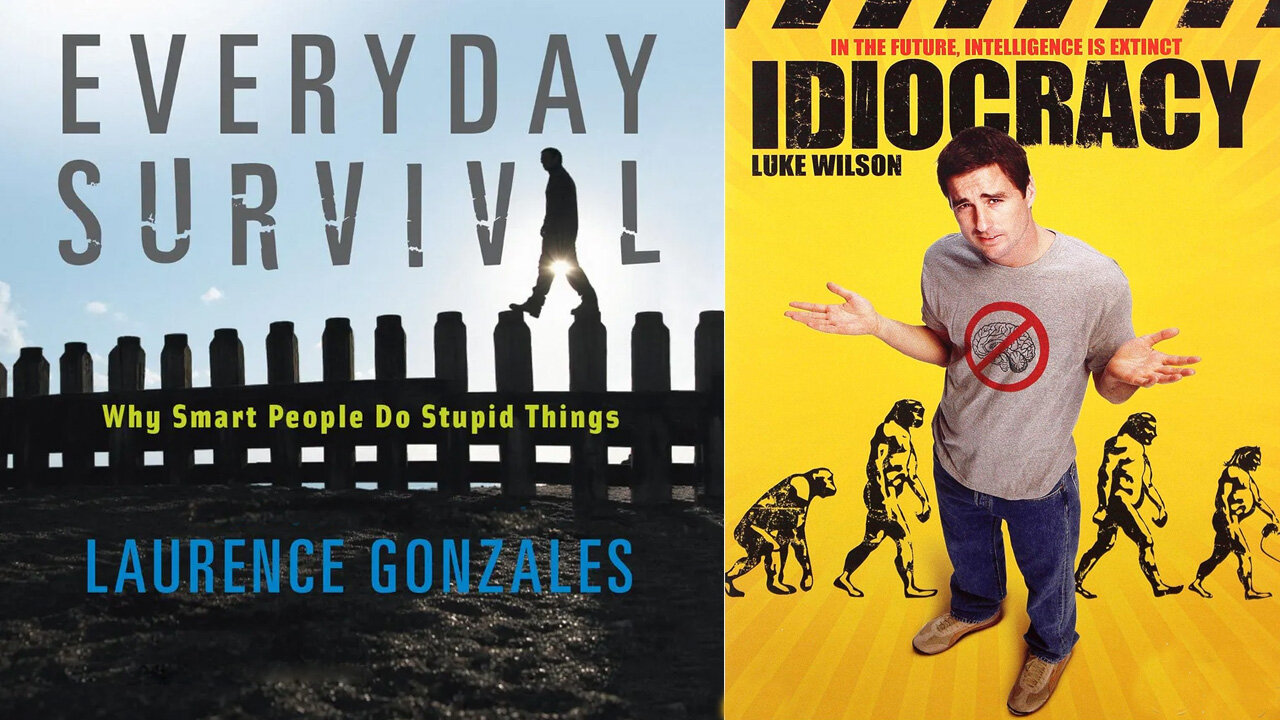Premium Only Content

'Everyday Survival' (1998) by Laurence Gonzales
Laurence Gonzales’s, 'Everyday Survival: Why Smart People Do Stupid Things', is a thought-provoking exploration of human error, decision-making, and the psychology of survival in ordinary and extraordinary circumstances. The book builds on the author’s earlier acclaimed work Deep Survival but shifts focus to the paradoxes of daily life: how our advanced brains and rational thought can sometimes betray us, leading us into danger or mistakes that seem obvious only in hindsight.
At the heart of Gonzales’s argument is the idea that human cognition, while highly evolved, is riddled with flaws. Our brains are pattern-seeking machines that constantly simplify complex situations. This tendency can be useful—it allows us to function efficiently—but it can also blind us to real dangers. For instance, smart, capable people often fall into traps because they trust intuition over evidence, or because their brains tell them a story that diverges from reality. Gonzales illustrates this through examples drawn from aviation disasters, space missions, and even mundane accidents in homes or workplaces.
A key theme of the book is the interplay between the conscious and unconscious mind. Much of survival, Gonzales argues, is shaped by automatic processes honed through evolution. These instincts, such as the fight-or-flight response, can sometimes save lives—but in modern environments they can also misfire, leading to catastrophic results. The book is filled with stories where seemingly minor lapses—overconfidence, inattention, misplaced trust—cascade into disasters.
Yet Gonzales does not leave the reader with despair. Instead, 'Everyday Survival' emphasizes awareness, humility, and adaptability. By understanding the quirks of human cognition and recognizing that intelligence does not guarantee safety, people can learn to manage risk more effectively. The book encourages readers to cultivate habits of attentiveness and skepticism, to listen to their environments carefully, and to prepare for the unexpected.
In conclusion, 'Everyday Survival' is both a cautionary and empowering text. Laurence Gonzales combines engaging storytelling with insights from neuroscience and psychology to explain why even highly competent individuals make grave mistakes. The book’s central message—that survival depends less on raw intelligence and more on awareness, humility, and adaptability—resonates not only for those facing life-and-death situations in the wilderness or the skies, but also for anyone navigating the hazards of everyday life.
-
 8:14
8:14
Hollywood Exposed
15 hours agoJoe Rogan Plays The Trump Clip BBC Didn’t Want You To See
11.5K6 -
 2:27
2:27
GreenMan Studio
14 hours agoGREENMANS STOCKING STUFFERS 6 – OMEGA’S ELIXIR OF MADNESS
10.4K2 -
 5:32:20
5:32:20
Turning Point Action
23 hours agoLIVE NOW: AMFEST DAY 4 - DONALD TRUMP JR., ERIKA KIRK, TOM HOMAN, VICE PRESIDENT JD VANCE & MORE…
1.1M279 -
 5:41:23
5:41:23
Misfits Mania
5 days ago $917.23 earnedMISFITS MANIA: Fight Night
3.28M -
 12:25
12:25
Actual Justice Warrior
1 day agoSan Francisco Democrats PASS Black Privilege Law
13.7K40 -
 LIVE
LIVE
DynastyXL
3 hours ago🎅 3 Sleeps Till Christmas 🎄🎁 Fortnite with viewers! !join
42 watching -
 52:08
52:08
Man in America
14 hours agoThe Sinister Plan to Crush Small Business — and Put You Under Corporate Rule
79.8K38 -
 1:11:28
1:11:28
Sarah Westall
15 hours agoNewsmax Fired Me on Air! What Gets You Fired These Days w/ Dennis Michael Lynch
56.7K25 -
 54:31
54:31
OFFICIAL Jovan Hutton Pulitzer Rumble
14 hours agoReview Of The Con In Progress!
76.2K21 -
 2:32:35
2:32:35
IsaiahLCarter
1 day ago $11.22 earnedRageaholics Anonymous || APOSTATE RADIO 038 (w/RAZ0RFIST)
54.3K8